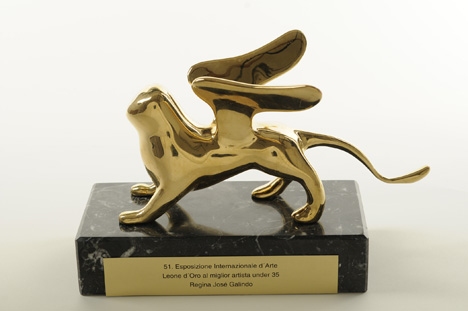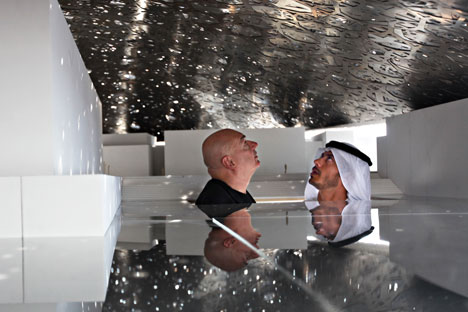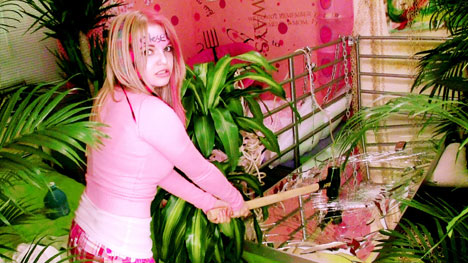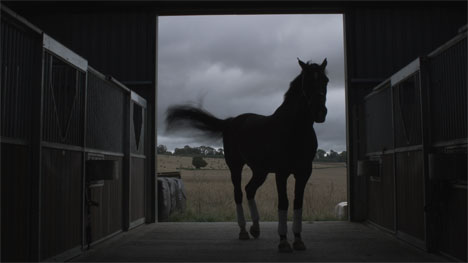Art Monthly 353
February 2012
Against Biennialisation
Francis Frascina
Arabic Agendas
Omar Kholeif
Inside Outsider Art
Paul O’Kane
Bea McMahon
Profile by Chris Fite-Wassilak
Buy Now – select:
Want to read this right now?
Get instant access to the entire back catalogue via Exact Editions from only £8.99!
Contents

Regina José Galindo False Lion 2011
Feature
False Lion
Can art and audiences resist biennialisation asks Francis Frascina
Elite members of the international art world use wealth (and yachts) to buffer themselves against local contexts, but some artists – and some audiences – utilise the jet-set nature of biennials to critique the exhibition context.
'Audiences are not, necessarily, uncritical and passive consumers slavishly following celebrity interests or duped by the culture industries.'

scale model of the new Louvre Abu Dhabi being studied by architect Jean Nouvel and HE Sheikh Sultan Bin Tahnoon Al Nahyan photographed by Galen Clarke 2009
Feature
Arabic Agendas
Omar Kholeif on western appropriation of art from the Arab world
Could the west's recent embrace of the Arab Spring become a suffocating bear hug?
'The overt politicisation of Basiony's work within the nationalistic context of the Venice Biennale mirrors, in some respects, the image appropriation that took place during the Egyptian revolt.'

Ryan Trecartin The Re‘Search (Re‘Search Wait‘S) 2009-10
Feature
Out of this World
Paul O'Kane redefines outsider art
If contemporary art's dependency upon context – which relational aesthetics simply extended – has resulted in an impasse, couldn't outsider art offer a glimpse at a way out?
'Outsider art is not a promotion of context at the expense of objects and artists; quite the reverse, it is an art that is all object and no context. The outsider object is not so much displaced à la Duchamp, Surrealism, Haim Steinbach etc, as de-placed.'
Comment
Editorial
PMQs
While David Cameron blithely claims that he abolished university funding and raised student fees in order to ensure that 'universities were properly funded', shouldn't the UK be learning from the US, where student debt is predicted to surpass credit card debt and hit $1trn this year, economically crippling a generation of jobless graduates?
'Anyone who still thought the loan system in the US was set up for the benefit of the student can now clearly see that it is the other way around. Since student debt is treated as consumer debt it could be said that the university sector has expanded to supply the financial sector with easy marks. It is no wonder that a student lobby group in the US has called for a "debt strike". How long before escalating student debt in the UK leads to similar calls?'
Letters
JJ Charlesworth wades into the debate surrounding fine art PhDs.
Artnotes
Lacoste censors its own prize because some of the shortlisted work is too political; Austrian commissions are dropped under political pressure; the health of UK arts is monitored; Tate drops BP sponsorship – not; UK museums lose funding for international projects; the EC sets about developing the world's largest programme of cultural funding; all the latest news on galleries, prizes, online resources and more.
Submissions: Send Artnotes info to artnotes@artmonthly.co.uk

Bea McMahon Signature 2011
Profile
Bea McMahon
Chris Fite-Wassilak on the video artist
Bea McMahon's background in mathematical physics informs the editing styles and narratives of her video works, which test the limits of our scientific, linguistic and cultural methods for understanding the world.
'McMahon's combination of the mathematical and the emotional seems to set them both as equal partners in our attempts to grasp what is around us. Her work is a look at our necessary inability to grasp beyond the human interior, and the more implicit and imaginative systems for understanding we create in attempting to mediate that inability.'
Reviews
Exhibitions
Performa 2011
various venues, New York
Kathy Battista
Performance Matters: Trashing Performance
Toynbee Studios, Tate Modern and Bethnal Green Working Men's Club, London
Morgan Quaintance
Catherine Opie
Stephen Friedman Gallery, London
Eliza Williams
Kai Althoff: Kaiki
Focal Point Gallery, Southend-On-Sea
Kathy Noble
The Indiscipline of Painting
Tate St Ives
Mark Harris
Terry Smith
John Hansard Gallery, Southampton
Jennifer Thatcher
Paul Caffell
Mummery & Schnelle, London
Christopher Townsend
Republic of the Moon
FACT, Liverpool
Bob Dickinson
Museum Show Part 1 & Part 2
Arnolfini, Bristol
Stephen Lee
Reviews
Artists' Books
Bookwork: Medium to Object to Concept to Art
Stephen Bury on Garrett Stewart's analysis of the book in art
'The theme of the book is the recent upsurge in the exhibition of largely sculptural book or book-like structures/installations in the white spaces of galleries.'
Reviews
Books
Steven Shaviro: Post-Cinematic Affect
Maria Walsh on artwork's ability to expose the working of capital
'Shaviro, referencing Benjamin Noys, suggests that while accelerationism has been shown to be a dubious political strategy, its value as an aesthetics is that it enables us to map the terrain in which we are immersed so that we may generate affects and imagine futures not predicted by industry.'
Mark Amerika: remixthebook
Morgan Quaintance dives into a theory mashup
'In the book's more conventionally written introduction, Amerika states that it is his intention to "mash up the jargon of academic writing" by setting the book somewhere between an "improvised keynote address" and "a stand-up comedy routine".'
Reviews
Film
Zagreb International Film Labs Meeting
Maxa Zoller meets the makers
'Pragmatic problems seemed to be overemphasised in the face of the complete lack of theoretical discourse which made the how more important than the why. I found that this lack of self-criticality coupled with, in some cases, a clear resistance to tackling more fragile and existential questions that touch the very raison d'être of filmmaking, could swiftly turn the most grassrooted analogue filmmaker into the bourgeoisie of the analogue class.'
Tony Morgan
Christopher Townsend on the best and worst of neo-avant-garde filmmakers
To describe Morgan as a British artist is problematic, even if he was born here and even if he had his first major exhibition at Indica Gallery in 1966 – just about the hippest gallery that could have shown him that year. Morgan was a perpetual expatriate: his work escapes the easy tags of national identity.'
Report
Korea
Seoul Searching
Paul O'Kane on the Korean art scene
'This ramshackle undergrad's heaven, conflating the trendy virtues of Brixton Village, Camden Town and Soho, nevertheless feels fragile amid the current drive to rejuvenate (read "obliterate") organically evolved parts of Seoul and replace entire neighbourhoods with "desirable" (for developers) 32-storey apartment blocks replete with cod-communitarian names like "Happy Ville". '
Salerooms
New York
Outgunned
Colin Gleadell on a sale that defied the crisis
'Contemporary art once again outgunned the Impressionists and moderns in the last round of sales in New York in November. The scoreline read an impressive $769m to the contemporaries, with a string of record prices that seemed oblivious to the growing economic crisis engulfing the euro zone, against $400m for the moderns.'
Artlaw
Artist's Resale Right
Bought and Sold
Henry Lydiate on the UK's adoption of EU legislation
'Evidently ARR has operated successfully in the UK since 2006: there is no credible evidence that ARR has damaged the secondary market for modern and contemporary sales in the UK, or the businesses of the art market professionals (dealers and auction houses) responsible for its collection and payment to artists' collecting societies; DACS recently reports having paid artists nearly £14m in royalties over the past six years.'
Listings
Exhibitions
Exhibition listings
Art Monthly's exhibition listings can also be viewed online.








